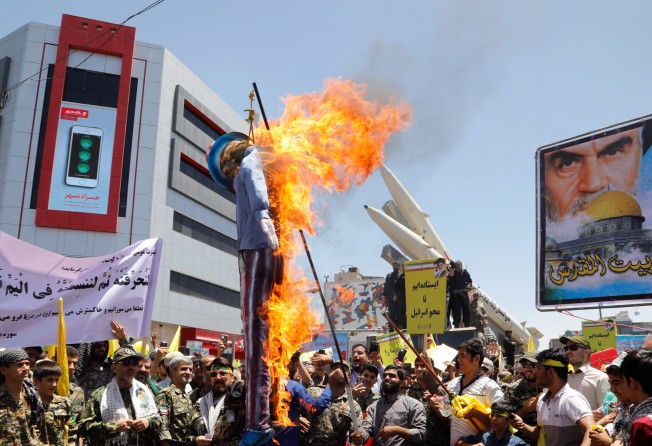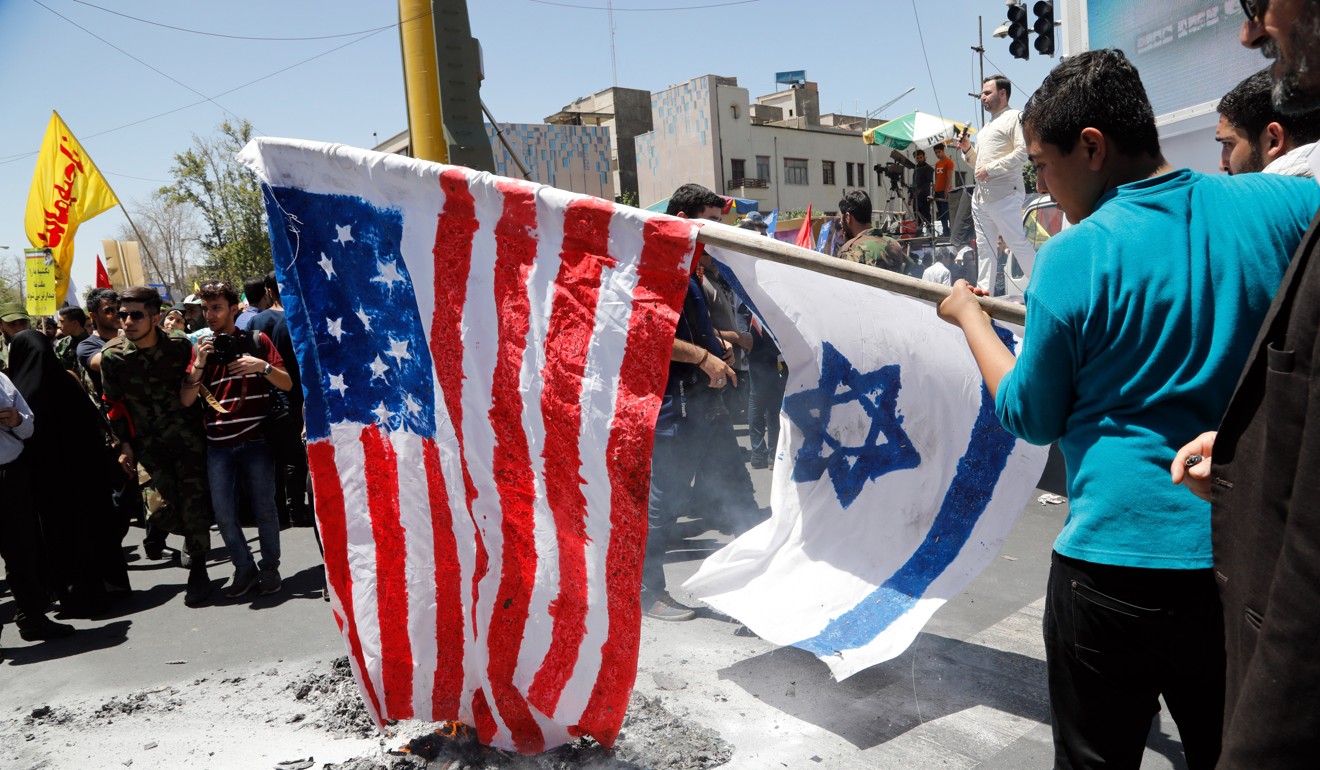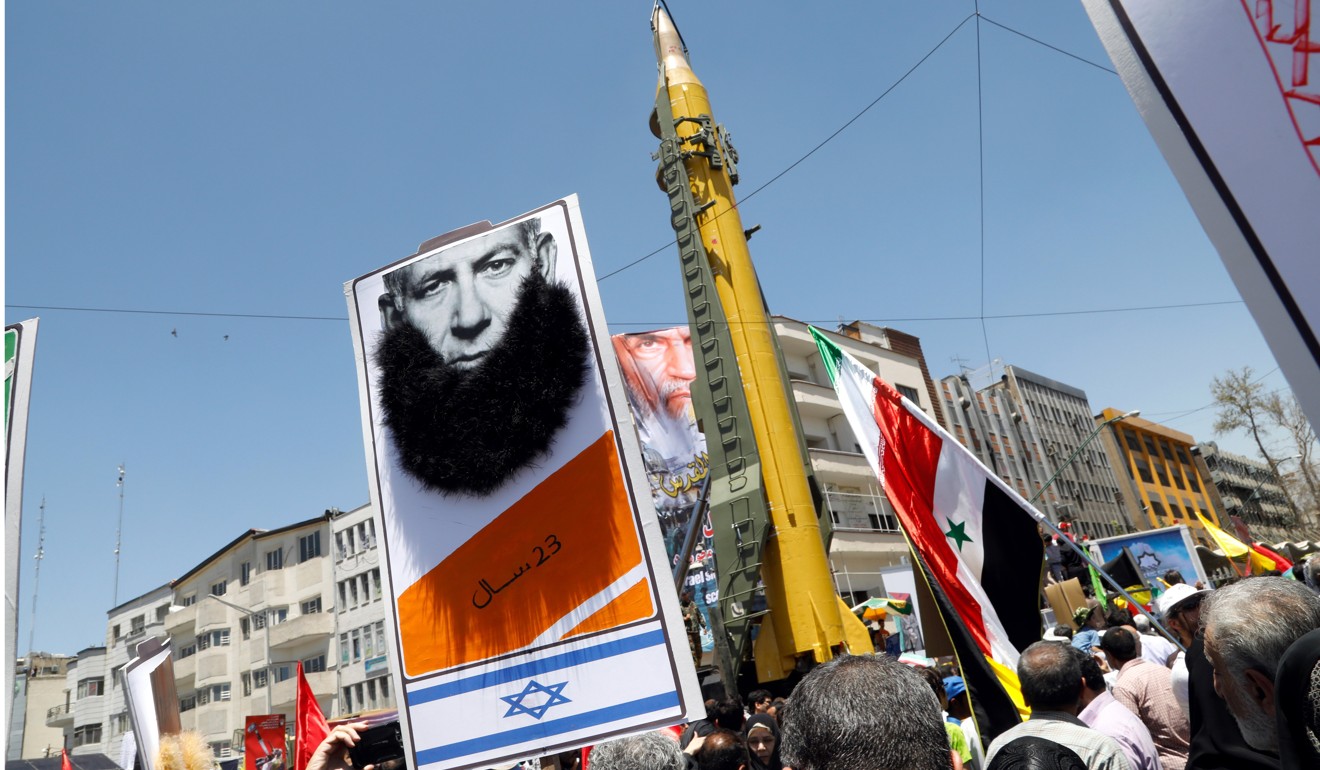Iran’s anti-Israel rallies, a Ramadan tradition, this year include ballistic missiles

Thousands of Iranians participated on Friday in annual anti-Israel rallies, a heavily stage-managed show of support for the Palestinian territories that included displays of ballistic missiles.
The rallies on Quds Day, after an ancient Arabic name for Jerusalem, included the usual signs condemning Israel and the United States – along with placards denouncing Saudi Arabia, its Sunni Muslim rival.
Protesters were bused into Tehran, the capital, or rode on subway trains whose fares were temporarily lifted. Demonstrators burned Israeli and American flags while others posed for selfies in front of yellow-painted missiles – including the Zolfaghar, the type Iran fired this week at alleged Islamic State targets in Syria.
Iran’s Revolutionary Guard paramilitary force said it fired six Zolfaghar missiles last Sunday on the city of Deir el-Zour, one of Islamic State’s last remaining strongholds in Syria. Iran supports Syrian President Bashar al-Assad and is in an escalating confrontation with Saudi Arabia, which backs anti-Assad rebels.
The missile strikes were Iran’s first in more than a decade, according to reports, and came in response to attacks this month on the parliament building and a shrine in Tehran that were blamed on Islamic State militants.
Speaking at the Friday prayer ceremony at Tehran University following the march, firebrand clergyman Ahmad Khatami said that Iran would continue its missile programme despite warnings from the Trump administration.
“The missiles shot at Daesh were mid-range – you can imagine the power of our long-range missile,” Khatami said, using an Arabic acronym for Islamic State.
The annual protests held on the last Friday of the fasting month of Ramadan are organised by Iran’s hardline Shiite Muslim establishment as a show of support for the Palestinian people. Iran does not recognise Israel and backs militant groups, including Hamas and Hezbollah, that oppose the Jewish state.
President Hassan Rouhani and other top officials attended the rallies while state television repeatedly played a song whose lyrics proclaimed that Israel “will be wiped out”.
Standing in the shade on a warm morning, Zia Zahedi, a white-turbaned clergyman, said protesters were showing their support as Muslims for “any oppressed people, wherever they live.”

“We are here to express our hatred against Saudi Arabia, Israel and America,” said Zahedi, 57. “The Saudi Arabian regime is not Muslim – they are allies of Israel.”
Sadegh Sofiyani, a retired teacher, said protesters were “soldiers of the supreme leader,” Ayatollah Ali Khamenei, who said in 2015 that Israel would cease to exist in 25 years.
“We are ready to shed our last drop of blood in any war against Israel, or in defending holy shrines in Syria and Iraq against Daesh, no matter the cost,” Sofiyani said.

Meanwhile, the head of Lebanese movement Hezbollah warned Israel against attacking Lebanon or Syria, saying “hundreds of thousands” of Arab and Muslim fighters would be ready to strike back.
“The Israeli enemy should know that if it launches an attack on Syria or Lebanon, it’s unknown whether the fighting will stay just between Lebanon and Israel, or Syria and Israel,” Hassan Nasrallah said.
“I’m not saying countries would intervene directly – but it would open the door for hundreds of thousands of fighters from all around the Arab and Islamic world to participate in this fight – from Iraq, Yemen, Iran, Afghanistan, Pakistan,” he said.
Nasrallah made the remarks in a speech broadcast on television.
Hezbollah fighters from Lebanon, and others from Iran, Iraq, Pakistan and Afghanistan, are battling alongside regime forces in Syria to defend the government of Assad.
The powerful Shiite movement and Israel have fought many battles including a devastating 34-day war in 2006 that killed 1,200 people in Lebanon, mainly civilians, and 160 Israelis, mostly soldiers.
Border skirmishes have broken out occasionally since then, and Nasrallah on Friday said any future confrontation would be “very costly for Israel”.
Tensions were rising this week along the frontier, with Israel accusing Hezbollah of expanding observation posts to conduct reconnaissance missions across the border.
Israel’s ambassador to the United Nations, Danny Danon, denounced the “dangerous provocation” and sent a letter of protest to the Security Council.
And the head of Israel’s air force said it would have “unimaginable” military power at hand in any future conflict with Hezbollah.
“What the air force was able to do quantitatively in the ... Lebanon war over the course of 34 days we can do today in 48-60 hours,” Major General Amir Eshel said on Wednesday.
“This is potential power unimaginable in its scope, much different to what we have seen in the past and far greater than people estimate.”
Associated Press, Agence France-Presse